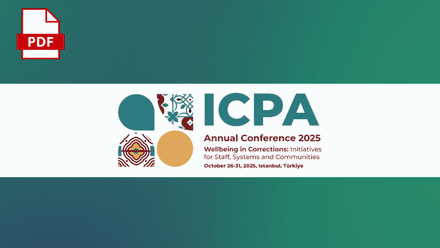The University of Poland: Preparing Graduates for a New Era in Corrections
________________________________________________________________
Below you will get an insight into the university’s innovative approaches to education, international collaboration, and its commitment to addressing the evolving challenges of the criminal justice system.
What are the most significant challenges confronting Poland's criminal justice education system today, and how is the University of Justice prioritizing its response to these issues?
The world of crime is rapidly changing. With an increase of cybercrime, cross-border offenses, and new forms of organized crime, there is a pressing need for curricula to stay current. The University of Justice in Poland is stepping up to the challenge, ensuring its graduates are ready to tackle these evolving threats. How? By focusing on the following challenges:
- Aligning educational content with evolving criminal activity: Yesterday’s knowledge won’t solve tomorrow’s crimes. That’s why the University of Justice are constantly updating their programs to incorporate the latest information on emerging crime trends. This will prepare students effectively navigate this dynamic environment.
- Embracing information and communication technologies: As criminals evolve, technology becomes essential. The University has integrated advanced tech training into its curriculum, with courses on cybersecurity, data analysis, and digital forensics. They’re preparing students to operate the latest sytems, tools, and techniques to combat the modern crime landscape.
- Bridging the gap between theory and practice: An effective criminal education requires more than just theoretical knowledge; real-world application is just as imperative. Recognizing this, the University of Justice collaborates with justice institutions and non-governmental organizations, enabling students to gain hands-on experience through internships and field training.
- Thinking globally: Crime knows no boarders. That’s why the Unniveristy of Justice fosters partnerships with foreign educational institutions and justice organizations, facilitating knowledge exchange and global cooperation. Through these partnerships students gain insights into a broader, global perspective on criminal justice.
What are the key achievements or ongoing initiatives of the University of Justice, Poland?
The University of Justice focuses on more than academic learning; it’s a driving force for positive change in Poland’s justice system. Here are some ways they’re making a difference:
- Empowering probation officers: In collaboration with Poland's National Council of Probation Officers they’ve created a comprehensive training program for probation officers. This program equips them with the skills to guide offenders towards a better path, especially those given a second chance through non-custodial sentencing. In Poland, it’s about rehabilitation and reintegration, not just punishment.
- Cultivating correctional leaders: The Correctional Leadership Academy is developing the next generation of leaders in the correctional field. These leaders are equipped to implement innovative methods and promote a more just and effective system.
- International collaboration: The university is actively collaborating with international organisations, sharing knowledge, and best practises to tackle global justice challenges. They're not just working within Poland; They’re contributing to a global conversation about justice.
How essential is international collaboration and engagement through organizations like the International Corrections and Prisons Association (ICPA) in addressing these challenges?
Corrections is a global challenge. That's why the University of Justice believe international collaboration, especially through organisations like the International Corrections and Prisons Association (ICPA), is essential. ICPA is promoting knowledge sharing and professional development by bringing together experts from around the world, creating a space to share knowledge, research, and innovative solutions. It's like a global think tank for corrections, where everyone learns from each other. It is also a global network of experts: ICPA membership connects organizations with a global network of corrections experts, allowing faculty and students to collaborate on research, share insights, and gain real-world knowledge of corrections challenges and innovations.
The University of Justice is a proud member of the ICPA, and they encourage other institutions to join the movement for the following reasons:
- Global connections: ICPA membership provides access to a global network of corrections and justice professionals. This enables institutions to form valuable connections, collaborate on projects, and share insights that transcend borders. For educators and students alike, these connections enrich learning and open doors to international perspectives on justice education and practice.
- Resources for excellence: ICPA offers a wealth of resources, from research and webinars and webinars to global conferences. As members, institutions gain access to the latest developments and best practices, equipping them to strengthen their curricula and prepare students for the complexities of modern corrections work.
- Championing human rights: ICPA champions human rights across all aspects of corrections. Through its resources and guidance, ICPA supports institutions in aligning their programs with international standards for humane treatment, inspiring a shared commitment to dignity, respect, and justice in corrections.
Are you ready to join ICPA?

